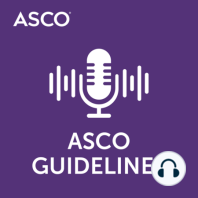18 min listen

Use of Biomarkers to Guide Decisions on Adjuvant Therapy for Early-Stage Invasive Breast Cancer Guideline Update
FromASCO Guidelines
Use of Biomarkers to Guide Decisions on Adjuvant Therapy for Early-Stage Invasive Breast Cancer Guideline Update
FromASCO Guidelines
ratings:
Length:
10 minutes
Released:
May 31, 2019
Format:
Podcast episode
Description
An interview with Dr. Fabrice Andre from Institute Gustave Roussy, Paris Sud University, in Paris, France on "Use of Biomarkers to Guide Decisions on Adjuvant Systemic Therapy for Early-Stage Invasive Breast Cancer: ASCO Clinical Practice Guideline Update: Integration of Results from TAILORx." This update provides updated recommendations on chemoendocrine therapy for patients who present with a hormone receptor positive, HER2 not overexpressed, axillary node negative early breast cancer. TRANSCRIPT The purpose of this podcast is to educate and to inform. This is not a substitute for professional medical care and is not intended for use in the diagnosis or treatment of individual conditions. Guests on this podcast express their own opinions, experience, and conclusions. The mention of any product, service, organization, activity, or therapy should not be construed as an ASCO endorsement. Hello, and welcome to the ASCO Guidelines Podcast Series. My name is Shannon McKernin, and today I'm interviewing Dr. Fabrice André from the Institute Gustave Roussy in Paris, France, lead author on "Use of Biomarkers to Guide Decisions on Adjuvant Systemic Therapy for Early Stage Invasive Breast Cancer. ASCO Clinical Practice Guideline Update: Integration of Results from TAILORx." Thank you for being here today, Dr. André. Thank you. So based on the title of this guideline, we know that this update was prompted by the results of the TAILORx trial. So can you tell us more about that trial and what its results were? Yes. So the TAILORx trial was a trial that randomized two treatment modalities, endocrine therapy versus chemotherapy endocrine therapy in patients who presented what we call an intermediate recurrence cohort. So before moving to the results, maybe we can discuss a little bit the background. What we knew from the past is the fact that patients who present a recurrence score below 11 should be treated with endocrine therapy alone, because they have the good outcomes. And patients who present recurrence score that is high, 31 but also can be more on 25, should receive chemotherapy. And we are talking about patients with hormone-receptor receptor positive, HER2-negative early breast cancer without lymph node involvement. And this is extremely important. So to summarize, it's a clinical trial that includes patients with hormone-receptor positive HER2-negative lymph node negative in early breast cancer, who present with recurrence score between 11 and 25. And the question is whether we can avoid adjuvant chemotherapy in these patients who present this intermediate score. So this is the general design and the question. In terms of research, what we have learned. We have learned that for patients above 50 years old, there is no difference between endocrine therapy and chemotherapy followed by endocrine therapy. So it means that this patient or these patients, we would consider endocrine therapy alone. Then, for patients below 50 years old, there was some difference. And I think we go further into the detail. There was some difference favoring the use of chemotherapy in the group of patients who presented with recurrence score from 16 to 25. And so what changes were made to the recommendations in this update of the guideline? So first, what were [INAUDIBLE] the previous guidelines. The previous guidelines were telling the clinician which genetic tests they could use in patients with hormone-receptor positive, HER2-negative early breast cancer. Now, the big change is that we are making guideline to explain how to use the test. And what is new is that we have made three important decisions. So first, for the patient is at the age above 50, now it is recommended clinician may recommend endocrine therapy alone for women older than 50 who present a recurrence score below 26. Before, the recommendation to use endocrine therapy alone was for patient's who present with low recurrence score. So it means now we have broadened-- we have increased the n
Released:
May 31, 2019
Format:
Podcast episode
Titles in the series (100)
Optimizing Anticancer Therapy in Prostate Cancer Guideline: An interview with Dr. Michael J. Morris from Memorial Sloan Kettering Cancer Center and Weill Cornell Medicine on the ASCO clinical practice guideline which addresses abiraterone or docetaxel with androgen-deprivation therapy (ADT) for metastatic... by ASCO Guidelines